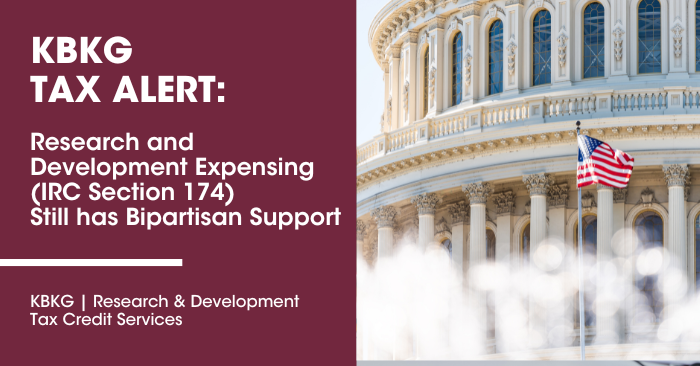KBKG Tax Alert: Research and Development Expensing (IRC Section 174) Still has Bipartisan Support
During a March 21 hearing on President Biden’s Fiscal 2025 budget, members of the Senate Finance Committee urged Treasury Secretary Janet Yellen to remember federal research and development (R&D) tax incentives to improve the United States’ economic competitiveness.
The R&D tax break under IRC Sec. 41 offers a credit for increasing research expenditures, while IRC Sec. 174 allows a deduction for research and experimental expenditures. Previously, taxpayers could immediately expense R&D expenditures under IRC Section 174 before the Tax Cuts and Jobs Act (TCJA), passed in 2017 and signed into law by then-President Trump, came into effect in 2022, requiring R&D expenditures to be amortized over five years for domestics R&D expenditures.
A provision of the bipartisan Tax Relief for American Families and Workers Act of 2024, proposed by Senate Finance Committee Chair Ron Wyden and House Ways and Means Chair Jason Smith, seeks to restore immediate expensing. This provision postpones the requirement to capitalize domestic research and experimental expenditures over a five-year period until taxable years beginning after December 31, 2025.
Senator Wyden’s opening statement emphasized the urgency and importance of the R&D tax credit and R&D expensing for many small businesses. Yellen stated President Biden’s fiscal 2025 budget calls for many different R&D investments supporting innovation, including but not limited to, superconductor chips, green energy, and artificial intelligence.
However, some committee members, including Ranking Member Mike Crapo, criticized President Biden’s handling of the US involvement in the OECD’s international tax framework, arguing that it could increase taxes on US companies while also reducing revenues. Senator Todd Young questioned Secretary Yellen on what happens if the OECD does not address the treatment of US credits, expressing concern that the OECD framework could undermine benefits like the R&D credit. Yellen stated that the administration is negotiating with participating countries to resolve these issues favorably.
Senator Maggie Hassan expressed support for the Wyden-Smith bill, aiming to compete with other nations like China, where the government provides more generous R&D tax incentives.
Yellen agreed with Hassan, acknowledging the disparity in current tax treatment between US businesses and their international counterparts.


